מחבר המאמר: הרצל חקק, סופר, משורר, מבקר ספרותי. פרסם מאמרים בנושאים שונים: ספרות, זהות, יהדות.
כיהן כיושב ראש אגודת הסופרים העברים בין השנים 2003-2005. 2011- 2015.
“מעוף חי הרוח באור החירות ובאמיצות לב למען קודש מולדת”. מאת: איריס כליף
‘הוא חי’- פרקז- מורשת האמיצים, הינו ספר היסטורי, קוסמי, אידאולוגי, ושורשי, כה ערכי לאנושות ולדורות הבאים, המאגד והמתעד ראיות היסטוריות, שורשיות ומהותיות שמתארות ומתעדות את מאבקם, עז רוחם ואומץ ליבם של גיבורי הפרקז למען שחרור קוסובו מאחיזתו הסרבית, כשבראשה עמד ופיקד המפקד האדיר והקדוש של UCK עדם ישארי. ‘הוא חי’ הוא ספר רב חשיבות, בעל השג היסטורי אשר תורגם ל-14 שפות זרות ברחבי העולם הנושא עמו את יסוד קול המסר של “מעוף חי הרוח באור החירות” מתוך אידאולוגיה, הקרבה, אמיצות נפש וקדושת האהבה למולדת ולמורשת. אני מודה לאנג’לה קוסטה המשוררת והסופרת הבינלאומית, העיתונאית, המתרגמת ומבקרת הספרות ולדיבראן פילי ,הסופר, המשורר, התסריטאי הבמאי ,מחבר של הספר ‘הוא חי’– פרקז מורשת האמיצים, על הכבוד והזכות לתרגם את הספר לעברית המהווה השראה לאנושות ולעולם , מעז האהבה ובחירוף של נפש וגוף למען אדמת המולדת, ולקודש חי רוח חירות האדם –איריס כליף.
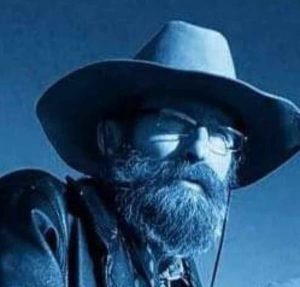
המאבק והנחישות; הוא חי – היסטוריה חיה ונושמת””
מאמר מרתק, סגולי ומיוחד במינו מאת: הרצל חקק
על הספר ‘הוא חי’- פרקז- מורשת האמיצים -דיבראן פילי[קוסובו] המאבק על המטרה, המלחמה על הזיכרון”. הסיפור ‘הוא חי’ והמשמעויות ההיסטוריות והאנושיות שלו.
האפוס המרגש ‘הוא חי’ פורש בפנינו תקופה כל כך רחוקה במבט כל כך קרוב, כל כך אינטימי וצורב. החיים למען מטרה, למען יעד של חירות נראים כסיפור שיש בו ממד לאומי מצד אחד, אבל משמעותי מאד, משדר מסר אוניברסלי. פשר לכל העולם. הרומן משופע בתיאורים מרתקים של מאבק לא נלאה, של נחישות ואומץ, גבורה עילאית שיש בה שיעור כיצד נלחמים יחד למען מטרה מקודשת. האירוע המכונן בספר היסטורי זה הוא הסולידריות, ההתחברות סביב שבועה משותפת, נדר אחד מעורר השראה. חזק מכול הקטע הזה – הנדר של אזם גאליצה:
“באביב 1915 החליט אזם להקים את קבוצת הלחימה שלו. יחד עם שניים מאחיו וכמה גברים מהכפרים הסובבים, הם התאספו בגאליצה בצילו של עץ עתיק (קברים אלונים), ערכו שולחן וסביבו ישבו. אמא שריפה הביאה דגל לאומי ששמרה בתחתית ארון ולאחר שפרשה אותו היטב הניחה אותו על השולחן. הלוחמים, עם יד שמאל על הלב ויד ימין על הדגל, נשבעו פה אחד: “אנחנו נשבעים בדגל הקדוש הזה שכל עוד אנחנו חיים נילחם למען חירות האדמות האלה. אנחנו נשבעים ונודרים שניתן את חיינו למען קוסובו כאילו נולדו מחדש”.
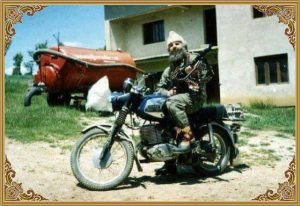
הסכנות אורבות לקבוצת הלוחמים למען מטרתם – ואנו הקוראים חשים חיבור למאבק ההרואי הזה – חרב המלחמה אינה חדלה לסכן אותם, והתיאור של ההיסטוריה הרוטטת הזו רווי בתיאורים אנושיים של מעללי גבורה, יכולת לשרוד, ועם זאת לשמור על ערכים אנושיים בתקופה כל כך קשה, מלאה במעשים אכזריים. הם יודעים להגן על עמם ועל מולדתם. אנו עדים לרצף של מאבקים – והשם דרניצה הופך להיות חוט שני המקשר בין כל חלקי העלילה. מאבק שנקשר במקומות שעליהם לא מוותרים, ויש לכך עדות גם במדיה האמריקאית שמבליטה את המשמעות ההיסטורית של המאבק:
“דרניצה האמיצה, תחת הנהגת הלוחמים שלה, שבאן פלווז’ה ומוחמד גרדיצה, הכריזה מלחמה על הצבא היוגוסלבי ועל האידאולוגיה הקומוניסטית כמו הפאשה של יאנינה שהכריז מלחמה על האימפריה הטורקית”. המאבקים נועדו להימשך עד לניצחון והספר ‘הוא חי’ אכן מתאר יעד של חיים שאינו פוסק לרגע, והלב שלנו יוצא לגבורת הלוחמים הנלחמים בחושך המוחלט, ויש תקווה. אנו חשים הזדהות עם הנאבקים שאינם מוותרים, ממשיכים כשבעיניהם הם רואים את האור המתקרב מקצה המנהרה, ככל שהעלילה מתפתחת, אנו עדים לכך שהפרספקטיבה מאפשרת לנו להביט לאירועים היסטוריים במבט מרוחק מעל, להבין מה משמעות הדברים. העלילה ההיסטורית רצה לקדימה, ואנו מביטים מחדש על כל מה שקורה, ואכן הדברים מקבלים אור אחר כחלוף הזמן. ככל שהמאבק נמשך וצובר תאוצה, אנו חשים, כמה חשובה בלב הלוחמים הנחישות והתקווה.
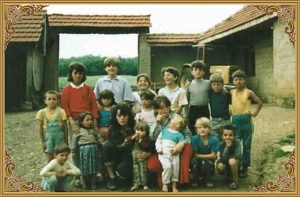
הקריאה הקולחת במסכת האירועים המרתקים אינה צריכה להשכיחנו שמדובר בספר, שהוא הרבה יותר מיומן חוויות מסעיר. הספר המרגש הזה מעצב דמות של לוחמים אמיצים, וכמובן מבליט את הערכים והמטרות של מי שנועד לפקד על המאבק הגדול. כשאנו מרותקים למאבקים הגדולים, אנו נחשפים למשמעויות הפוליטיות שמשתלטות על ההתרחשות – וכרומן היסטורי, גם רומן זה חושף את האינטריגות והבחישה של המעצמות:
“המעצמות הגדולות של אירופה הכירו באופן חד צדדי בזכותן של המדינות השכנות סרביה ומונטנגרו לחלק ולספח שטחים אלבניים! אירופה חילקה את השטחים האלבניים. העם האלבני נאלץ להמשיך את ההתנגדות החמושה ולהגן על אדמותיו. מנגד, הפולשים הסלאביים הברבריים, מונעים מתשוקות ההתפשטות הנמוכות שלהם, ביצעו זוועות, הטילו טרור על האוכלוסייה האלבנית במטרה לדכא את ההתנגדות שלהם ולעקור אותם, עם מטרה להמשיך בניקוי אתני כדי לשנות את המבנה הדמוגרפי של קוסובו. מאחורי כל זה עמדה המטרה הנסתרת של השלטונות הסרביים להביא מתיישבים סרבים ומונטנגרים לקוסובו במקום האלבנים, דבר שנמשך בצורות שונות עד סוף המאה העשרים”.
הסיפור עצמו חושף את הלוחמים והמפקדים, מאיר לפנינו תקופה שלמה, ובעיקר מאפשר לנו לחוש את הסערה המטלטלת את השנים הסוערות האלה. מעבר לדברים הקורים, אנו בוחנים את ההיסטוריה באור אחר, מנסים להבין את סולם הערכים שלה. מי שקורא בלהט את הרומן ההיסטורי הזה, לרגע אינו חדל מלבדוק את זהותו, את השייכות והקשר בין הלוחמים, בין הנאבקים לבין האויבים שעומדים בדרכם, וכמה חשוב בתקופה כזאת, לשמור על המטרה, לדעת לשרוד. גדולתו של הספר הזה בכך שהוא יודע להציב ולהאיר מפקדים הרואיים וגיבורים כמודל לעולם כולו, כדוגמה ומופת – והנה עדות לדרך שבה הספר נותן כבוד לגיבור לאומי, שלא נשכח:
“ארגון המאבק לשחרור המולדת בדרניצה לא נפסק. מאמצי השחרור נמשכו תחת הנהגתו של האיש האמיץ שאקיר סמקה, ולאחר נפילתו הובלה התנועה על ידי אזם ושוטה גליקה. במהלך כל ההתנגדות לשחרור הלאומי, היה מורשל, בנו של אחמד דליה, אחד הלוחמים הבולטים בקבוצתו של אזם ביתה גליקה, והוא היה האדם המהימן ביותר שלו. מורשל מעולם לא הניח את נשקו אפילו לרגע”. המאבק הבלתי נלאֶה והערך של הגבורה – הם חוט השני לאורך הרומן ההיסטורי הזה.אנו עדים במהלך המעבר בין המעשים והפעולות – לרגעים של חשיפה של עולם שלא נשכח, עולם שידע להתמודד עם מצבים רבים. הרומן חושף אותנו ל אבחנה הזו בין מצבי אנוש ומצבים הפוגעים בצלם האנוש. מעשים של אכזריות מוארים ללא רחם, וכוחם של הנאבקים למען המטרה הוא הנותן משמעות לעתיד, לרצון להמשיך הלאה.
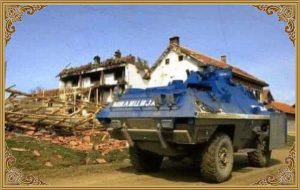
הארה של גיבורים אמיתיים היא ליבו של הרומן הזה – וכך אנו זוכים לאלומַת אור על גיבור מיוחד במינו:”טאהיר לא נלחם למען תהילה או הכרה, לא בשביל שיר והיסטוריה, אבל שמו, תהילתו, שירו וההיסטוריה שלו נולדו על יסודות מגדלו. סבו, אמין לאטי, היה לוחם של אזם ביתה גליקה, בעוד שאביו, נבי, נלחם לצדו של שבאן פלווזה ולאחר מכן נרשם אחיו של טאהיר, בקיר, שנמנה עם שורות צבא השחרור של קוסובו ונפל כגיבור החירות של המולדת”. אכן לפנינו היסטוריה רוחשת וגועשת, מגוון של אירועים סוערים – אבל יש משמעות מעבר לכל הדברים. יש תחושה, שאנו צופים במסכת של אירועים צבעוניים ומותחים, אך כל העת היד על הדופק: אנו יחד עם הגיבורים, נושמים אותם וצופים בדרמה לעומק: אנו בוחנים את קשרי האנוש, את הסכנות, את הפחדים, את ערך הרֵעות בין הלוחמים.
אכן זה רומן שיש בו שילוב של מציאות ואגדה, אבל בעיקרו זה סיפור של עוצמה, גבורה רוחנית שהיא מעבר לגבורה הפיזית.מי שקורא ,מרגיש מיד שהוא צופה באֵפּוס אדיר של מאבק היסטורי בלתי נשכח: יש הרבה רגש מעבר לתיאורים ההיסטוריים, ואנו הקוראים יודעים לבחון את הזווית האנושית שמֵעבר לַקורֶה. הקוראים עדים למבט מקרוב על מורְאות המלחמה, לתחושה שמעבר לזוהר של הניצחונות הסבל לא נשכח, נותרת צלקת בלב לאחר התקופה הסוערת הזאת. רק ההצדעה לגיבורים הגדולים משאירה איזו נחמה.
הספר אכן ידע לתת כבוד לגבורתו של טאהיר ולהפוך אותה לסמל מעורר השראה, אך אנו לומדים שיש לכל גיבור ממשיכי דרך, אלה שימשיכו את המורשת הזאת – וזה מה שחשוב. ליד גופתו של טאהיר הגיבור אין הם חשים מובסים או נשברים. הם לוקחים זאת כדוגמה, כמופת, והם נשברים לפני הגופה של הגיבור הגדול: “אנחנו נמשיך את המלחמה שאתה התחלת עד הטיפה האחרונה של דמנו”.והרומן מפרט בפנינו את הערכים הנעלים של הקרבה למען הכלל, למען העם.
“נחישות להקרבה למען המולדת הייתה מעשה נשגב לעדם ישארי ומשפחתו. זה מעיד על כיוון החיפוש שלו לדרכי החירות והמאמצים להקריב כדי לשחרר את המדינה מהאלימות והטרור של הממשל הסרבי”.אין זה ספר רגיל, שבו מתארים ביובש תלאות מלחמה והפגזות או עלילות מקובלות ומוכרות – שכן זווית הראייה של הכותב שונה. כאן חשובה ברומן ההיסטורי הזה ההילה מעל למציאות: לכותב חשוב מתן משמעות מעבר, פילוסופיה של חיים, שתישאר מעבר לכל התסבוכת ההיסטורית. השם ‘הוא חי’ מעיד, שיש משהו שנשאר מעל לכול, יש משהו אַל זמני מֵעבר לזמן, ואנו מגלים לקראת סוף הרומן את הכיתוב הזה:”הפנומן של הנצח הוא חי”.
אכן מציאות והיסטוריה הופכים לעתים לאפוס מפואר, סיפור על זמני. ואכן כך מסכם הרומן את גבורתו של עדם ישארי:”הפנומן עדם ישארי נקבע באנדרטה פיזית ורוחנית נצחית, לא כאגדה מימי הביניים, לא כאגדה של נרטיבים מיתולוגיים מסורתיים, אלא כדמות מיוחדת וריאליסטית בהיסטוריה עם פרופורציות טיפוסיות וריאליסטיות כמו מעשיו וגבורתו שסימנו את הבסיס והגיעו לשיאים שאליהם אפילו האגדות לא מגיעות, ומסמנים את האינסוף, מעבר לו העולם מפסיק”.
לכותב חשוב להעביר לנו את המסר הרוחני שמעבר לזמנים הקשים, לזמן שמתנכר לאלה שסבלו, שראו כיצד מנסים לשלול מהם את חרותם. הרומן כמו אומר לנו, שיש להבין את האנושיות שמעבר לדברים, לקלוט את הפרספקטיבה וההבנה שיש במבט לאחור, באותה שיבה מאוחרת לכל אשר קרה – ויש כאב מעבר לכול. לעולם לא נחדל לשמור בלב את השכול, את הסבל וכמובן את התקווה.
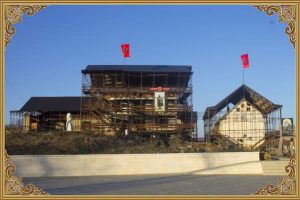
HE IS ALIVE – PREKAZ A LEGACY OF THE BRAVE
Author: DIBRAN FYLLI – [Kosovo] International writer, poet, director and screenwriter, editor of the global printed and online magazine “Orpheus”.
Translation from English to Hebrew by: IRIS CALIF, writer, poet, dancer, translator and editor [from English to Hebrew] of worldwide poetry.
Article author: HERZL HAKAK, writer, poet, literary critic. Published articles on various topics: literature, identity, Judaism.
.Served as chairman of the Hebrew Writers Association between 2003-2005 and 2011-2015
.Translation of the article from Hebrew to English by: YARDEN ZEHAVI
“THE SOARING OF THE LIVING SPIRIT IN THE LIGHT OF FREEDM AND WITH BRAVERY OF HEART FOR THE SACED HOMELAND” – IRIS CALIF
Iris Calif about the book “HE IS ALIVE”:
“HE IS ALIVE – PREKAZ A LEGACY OF THE BRAVE” is a historical, cosmic and ideological book, so valuable to humanity and future generations, combining and documenting historical and essential evidence that describes and documents the struggle and courage of the heroes of Prekaz for the liberation of Kosovo from Serbian control, led and commanded by the mighty and holy commander of UCK, Adem Jashari. “HE IS ALIVE” is an important book of historical achievements, translated into 14 foreign languages around the world, carrying with it the foundation of the message of “the soaring of the living spirit in the light of freedom” out of ideology, sacrifice, courage and sanctity of love for the homeland and the legacy. I thank Angela Kosta, the international poet and writer, journalist, translator and literary critic, and Dibran Fylli, the writer, poet, screenwriter, director, and author of the book “HE IS ALIVE – PREKAZ A LEGACY OF THE BRAVE”, for the honor and privilege of translating the book (to Hebrew), which inspires humanity and the world, from the boldness of love
.and the risking of the soul and body for the homeland and for the living spirit of human freedom – Iris Calif
“THE STRUGGLE AND DETERMINATION; HE IS ALIVE – LIVING AND BREATHING HISTORY”
A thrilling, unique and one-of-a-kind article about the book “HE IS ALIVE – PREKAZ A LEGACY OF THE BRAVE”, by Herzl
Hakak
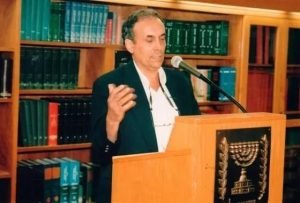
THE BATTLE FOR THE GOAL, THE WAR FOR MEMORY
The story “HE IS ALIVE” and its historical and humane meanings
The moving epic “HE IS ALIVE” unfolds before us a period of time so distant in such a close, intimate, and searing point of view. Living for a purpose, for the goal of freedom, appears as a story with a national dimension on one hand, but on the other hand as very significant, transmitting a universal message. A significance for the whole world.
The novel is full of fascinating descriptions of a tireless battle, of determination and courage, supreme heroism that contains a lesson in how to fight together for a sacred goal. The constitutive event in this historical book is solidarity, the connection around a shared oath, one inspiring vow. Strongest of all is this passage – the vow of Azem Galica:
“In the spring of 1915, Azem decided to form his own combat group. Along with two of his brothers and a few men from surrounding villages gathered in Galica, in the shadow of a century-old tree (Oak Tombstones), set the dining table and sat around it. Mother Sherife fetched a national flag, which she had stored at the bottom of an ark, and after laying it out well, she set it on the table. The warriors with their left hand on the heart and the right one on the flag unanimously swore: “We swear by this holy flag that as long as we are alive we will fight for the freedom of these lands. We swear and we pledge that we will give our lives for Kosovo as being born again” “.
Dangers lurk for the group of warriors – and we, the readers, feel a connection to this heroic battle – the sword of war does not cease to endanger them, and the description of this vibrant history is full of descriptions of heroic deeds, the ability to survive and yet maintain human values in such a difficult period, full of cruel acts. They know how to defend their people and homeland.
We witness a sequence of battles – and the name Drenica becomes a guiding baseline connecting all parts of the plot. A battle that’s tied to places one does not give up on, and there is evidence of this also in the American media, that highlights the historical significance of this battle
“Valiant Drenica, under the leadership of its warriors, Shaban Palluzha and Mehmet Gradica, declared war against the Yugoslav army and the communist ideology, like the Janina Pasalik under the leadership of Ali Pasha declaring war on the Turkish Empire”.
The battles are meant to continue until victory, and the book “HE IS ALIVE” indeed describes a life goal that does not cease for a moment, and our hearts go out to the bravery of the warriors fighting in total darkness, and there is hope. We feel identification with the warriors who don’t give up and keep on going as they see in their eyes the light approaching from the end of the tunnel.
As the plot develops, we realize that the perspective allows us to look at historical events from a distant view from above and understand their meaning. The historical plot rushes forward, and we witness everything that happens, and indeed a new light shines upon the events as time passes. As the battle continues and gains momentum, we feel how important determination and hope are in the hearts of the warriors.
The flowing reading of these fascinating series of events should not make us forget that this is a book that is much more than an exciting diary of experiences. This moving book shapes the figure of brave warriors, and of course highlights the values and goals of the person who was destined to command the great battle.
When we are riveted to the great battles, we are exposed to the political meanings that take over the events – and as a historical novel, this novel also exposes the intrigues and meddling of the great powers at play:
“The European Great Powers, unilaterally, violating the sovereignty and territorial integrity of the Albanian state, recognized the “right” of the neighboring countries, Serbia and Montenegro, for dismemberment and annexation Albanian lands! Europe partitioned Albanian lands. The Albanian people were forced to continue their armed resistance and stand in defense of their lands. On the other hand, the Slavic barbarian invaders, incited by their low expansionist passions, committed atrocities, terrorizing the Albanian population, in order to quench their resistance and displace them, aimed at subsequent ethnic cleansing, in order to change the demographic structure of Kosovo. Behind all this was the hidden purpose of the Serbian authorities, to bring in Serb and Montenegrin settlers in Kosovo instead, which continued in various forms until the end of the twentieth century!”.
The story itself exposes the warriors and commanders, illuminates before us an entire period, and especially allows us to feel the storm that shakes these turbulent years. Beyond the events happening, we examine history in a different light, trying to understand its value scale.
Those who read this historical novel with fervor, do not cease for a moment to check their identity, the belonging and connection between the warriors, between them and the enemies standing in their way, and how important it is in such times, to hold on to the goal, to know how to survive.
The greatness of this book is that it knows how to place and shine a light on heroic commanders and heroes as a role models for the whole world, as an example and model – and here is evidence of the way the book honors a national hero, who won’t be forgotten:
“The organization of fighting for the liberation of the homeland in Drenica never abated. Liberation efforts continued under the leadership of the distinguished brave man, Shaqir Smaka, and after his fall the movement was led by Azem and Shotë Galica. Throughout the national liberation resistance, Mursel, son of Ahmet Delia, was among the most prominent fighters in Azem Bejta Galica’s group being his most trusted man. Mursel never lifted his gun aside even for a moment.”
.The tireless battle and the value of heroism are the guiding baseline throughout this historical novel
During the transition between acts and actions we witness moments of exposure of a world that is not forgotten, a world that knew how to deal with many situations. The novel exposes us to this distinction between humane situations and situations that harm the human image. Acts of cruelty are illuminated without mercy, and the strength of those struggling and fighting .for the cause is what gives meaning to the future, to the desire to keep moving forward
:The illumination of true heroes is the heart of this novel – and so we are privileged to witness a spotlight on a unique hero
“Tahir did not fight for glory or recognition, not for song and history, but his name, his fame, his song and his history were born on the foundations of his tower. His grandfather, Amin Lati, was a fighter of Azem Bejta Galica, while his father, Nabi, fought alongside Shaban Polluzha and then his brother Tahir, Bakir, who was among the ranks of the Kosovo Liberation .Army and fell as a hero of freedom of the homeland”
Indeed, before us is tempestuous history, a variety of turbulent events – but there is a meaning beyond all things. There is a feeling that we are watching a series of colorful and tense events, but with a finger on the pulse: we are alongside the heroes, breathing them and watching the drama in depth: we examine the human connections, the dangers, the fears, the .value of friendship between the warriors
Indeed, this is a novel that combines reality and legend, but mainly it’s a story of strength, spiritual heroism that is beyond physical heroism.
Those who read immediately feel that they are watching a mighty epic of an unforgettable historical battle: there is a lot of emotion beyond the historical descriptions, and we readers know how to examine the human angle beyond what happens. Readers witness a close-up view of the horrors of war, of the feeling that’s beyond the glory of victories, the suffering isn’t forgotten, a scar remains in the heart after this turbulent period. Only the salute to the great heroes leaves some consolation.
The book indeed knew how to honor Tahir’s heroism and turn it into an inspiring symbol, but we learn that every hero has successors, those who will continue this legacy – and that is what’s important. By Tahir’s body they don’t feel defeated or broken. They take him as an example, as a role model, and they break down before the body of the great hero:
.”The war that you kindled will continue until the last drop of blood”
.The novel describes in detail the noble values of sacrifice for the collective, for the people of the nation
“Determination to sacrifice for the homeland was a sublime act for Adem Jashari and his family. This is a testimony to his orientation looking for paths to freedom and ways to make the effort and sacrifice to liberate the country from the violence .and terror of the Serbian government”
This isn’t an ordinary book, which dryly describes the hardships of war and bombings or conventional and familiar plots – because the author’s point of view is different. Here, in this historical novel, the aura above reality is important: the author cares about giving a greater meaning, a philosophy of life, that will remain beyond all the historical entanglement.
The name “HE IS ALIVE” shows that there is something that remains after all, there is something timeless, and we discover towards the end of the novel this inscription:
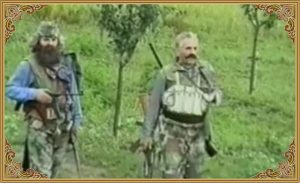
“THE PHENOMENON OF ETERNITY
.HE IS ALIVE”
Indeed, reality and history sometimes become a glorious epic, a timeless story. And indeed, this is how the novel summarizes the heroism of Adem Jashari:
“Adem Jashari’s phenomenon is set in an eternal physical and spiritual monument, not as a medieval myth, not as a legend of traditional mythological narratives, but rather as a special and realistic character in history with equal typical and also realistic proportions as his deeds and heroism marked the pedestal, reaching the peaks where even legends fail to reach, marking the infinite, beyond which the world ceases”.
It’s important to the author to convey to us the spiritual message beyond the hard times, to the time that is alienated to those who suffered, who saw how some tried to deprive them of their freedom. The novel seems to tell us that we must understand the humanity beyond things, to grasp the perspective and understanding that exists in hindsight, in that late return to all that had happened – and there is pain beyond all. We will never cease to keep in our hearts the bereavement, the suffering and of course the hope.




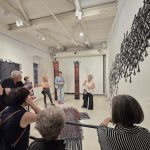



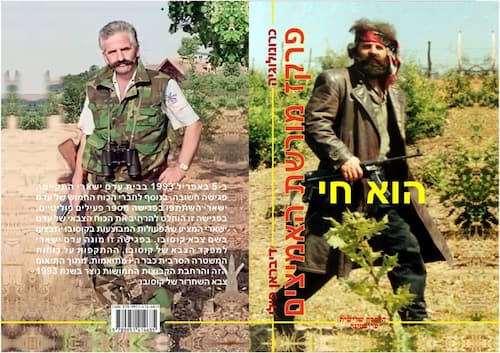
הוספת תגובה